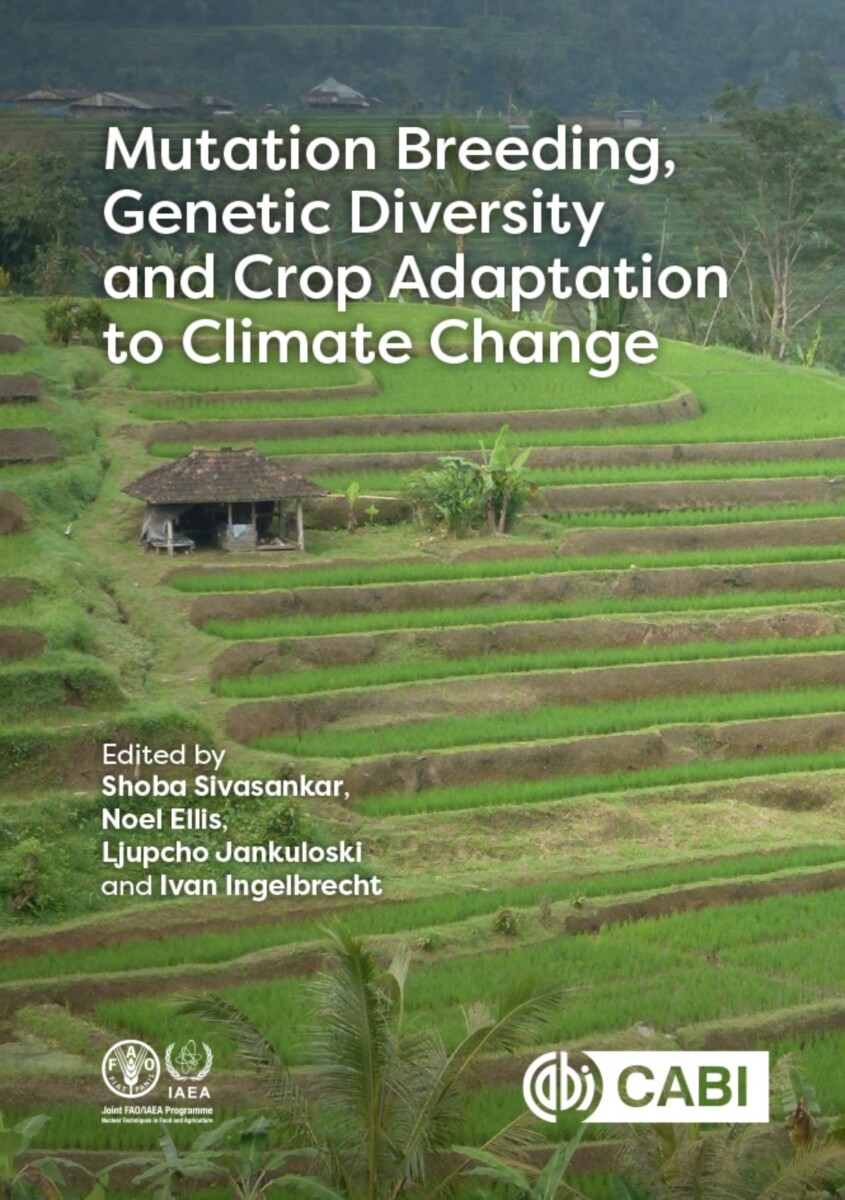Mutation Breeding, Genetic Diversity and Crop Adaptation to Climate Change
- Publisher
CABI - Published
27th October 2021 - ISBN 9781789249095
- Language English
- Pages 512 pp.
- Size 6" x 9"
The year 2018 marked the 90th anniversary of induced mutagenesis in plants. The FAO/IAEA International Symposium on Plant Mutation Breeding and Biotechnology held in 2018 reviewed achievements in crop improvement through mutation breeding in several countries across the globe, and discussed innovations in mutation induction, precision phenotyping and genomics applications. Induced genetic variation is important for crop improvement especially in instances where there is limited variation in existing germplasm pools to achieve desired levels of crop performance, and where techniques such as hybridization cannot be easily applied. Its application becomes further significant as the dual threats of population growth and climate change increasingly challenge global food and nutrition security. Higher production of nutritional food and reduction of crop losses imposed by extreme events like droughts, high temperatures, floods, diseases and pests call for induced novel genetic variation. While recent breakthroughs in whole genome-based mutation detection technologies increase the efficiency and precision of breeding in all crops, in vitro techniques coupled with mutagenesis broaden the genetic base of vegetative and horticultural tree crops and reduce their breeding cycles.
In this book an international team of expert authors review achievements, new developments, trends and challenges in the field of plant mutation breeding, across the scientific community and the private sector. Chapters highlight specific challenges, such as emerging transboundary threats to crop production, and assess the overall importance of mutation breeding to food security.
Coverage includes:
- Contribution and impact of mutant varieties to food security.
- Mutation breeding for adaptation to climate change in seed propagated crops.
- Mutation breeding for ornamental and vegetatively propagated crops.
- Enhancing agro biodiversity through new mutation induction techniques.
- New challenges and technologies in plant genomics and breeding.
Sobhana Sivasankar, PhD
Sobhana (Shoba) Sivasankar has 20+ years’ experience leading and managing agricultural R&D programs. She is currently the Section Head for Plant Breeding and Genetics at the Joint FAO/IAEA Division of Nuclear Applications in Food and Agriculture at the International Atomic Energy Agency in Vienna, Austria. Prior to this role, she was Director for two CGIAR Research Programs, on Dryland Cereals and on Grain Legumes, and successfully led the design and development of the merger of the two in the current GLDC program. Before this she led the development and coordination of the transgenic pipeline for agronomic traits from discovery research to early product development for DuPont Pioneer, now Corteva, in Iowa. During her career at DuPont Pioneer, she worked in the technical areas of stress physiology and silage digestibility and provided scientific leadership for the development of DuPont’s FASTcorn high-throughput phenotyping platform.
Born in the southern Indian state of Kerala, Shoba earned her undergraduate and Masters’ degrees in agricultural sciences and agronomy from Kerala Agricultural University. She has a PhD in Botany from the University of Guelph, Canada, and MBA from the University of Iowa. She was a Post-Doctoral Fellow in the same university in the Department of Molecular Biology and Genetics.
Shoba has over 20 issued patents and 109 published patent applications, and several peer-reviewed publications.
Thomas Henry Noel Ellis, PhD
Thomas Henry Noel Ellis has more than 30 years of experience in plant molecular genetics. He is currently an honorary academic in the Dept of Biological Sciences at the University of Auckland, New Zealand, and a visiting scientist at John Innes Center, UK. Before this, he was Director of the CGIAR Research Program on Grain Legumes based in Hyderabad; Professor of Crop Genetics at IBERS Aberystwyth, Scotland; and Associate Head of Crop Genetics at the John Innes Centre in Norwich, UK. He moved to the John Innes directly after completing his PhD at the University of Edinburgh. The focus of his research in recent years has been on the evolution and diversification of legumes at genomic and phenotype levels.
Ljupcho Jankuloski
Ljupcho Jankuloski is currently Technical Officer in Plant Breeding and Genetics at the Joint FAO/IAEA Division of the United Nations. Ljupcho is a plant breeder/geneticist, and prior to his IAEA role he was Associate Professor of Plant Genetics and Breeding at Ss. Cyril and Methodius University in Skopje, North Macedonia.
Ivan Ingelbrecht, PhD
Ivan Ingelbrecht obtained his PhD in Plant Molecular Biology at the University of Ghent, Belgium in 1993. As a PhD student he published one of the first cases of transgene silencing in plants. As a Research Associate at Texas A&M (1996-2000) he produced virus and herbicide resistant transgenic sugarcane plants and developed, together with colleagues, a genetic transformation system for grapefruit. At Texas A&M, he isolated novel proteins involved in RNA interference pathways.
In 2000-2001, he worked as a Patent Liaison at CropDesign, Ghent, Belgium. He has 12 years working experience in Sub Saharan Africa, first as a post-doc (1994-1996) and later as Head of the Biotechnology Laboratory at the International Institute of Tropical Agriculture (IITA-2001 to 2009) in Nigeria. At IITA, Dr. Ingelbrecht was PI on research projects to develop genetic transformation systems for the tropical crops cassava and black-eyed peas and for molecular markers diversity. As Project Coordinator and member of the Research-for-Development Council at IITA, he was also involved in research management and priority setting for the Institute.
In 2010, he joined the UN Industrial Development Organization and the Institute Plant Biotechnology Overseas at the University Ghent as Program Manager of the International Industrial Biotechnology Network.


